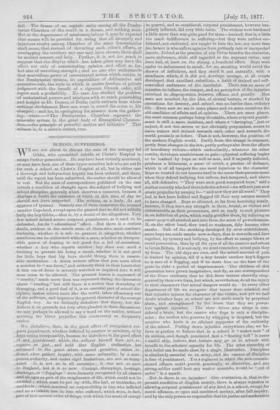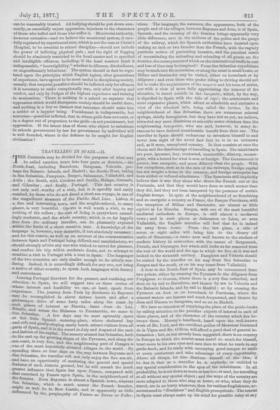SCHOOL SUFFERINGS.
WE are not about to discuss the case of the unhappy lad Gibbs, who committed suicide at Christ's Hospital to escape further persecution. He may have been virtually murdered, or may have been one of those hyper-sensitive lads who are not At for such, a school as Christ's Hospital at all, but in either case a thorough and independent inquiry has been ordered,, and there, until the report has been submitted, the matter should be allowed to rest. But the mass of correspondence published on the case reveals a condition of thought upon the subject of bullying and school discipline generally which deserves a comment, because it dieplays a doubt the existence of which at this time of day we should not have suspected. The writers, as a body, do not approve of tyranny. Scarcely one of them exonerates the accused monitor Copeland, except upon the ground that he did not wilfully bully the boy Gibbs,—that is, by a denial of the allegations. Very few indeed defend severe corporal punishment, as it used to be defended, for its " educational " effect. But there is a curious doubt, evident in the minds even of those who most condemn barbarity, whether it is safe to prevent it altogether, whether manliness can be cultivated without a cane, whether an irrespon- sible. power of beating is not good for a lad of seventeen, whether a boy who reports another boy does not need a bruising to prevent his being a sneak, whether it is not good for little boys that big boys should thump them in reason- able moderation. A dozen writers affirm that you must allow a monitor to "use force," and evidently think in their hearts that if this use of force is severely matched or inquired into it will soon cease to be allowed. The greatest horror is expressed of
cruelty," much more than was expressed during, the discussion about "binding," but still there is a notion that thwacking or thumping, and a good deal of it, is an essential part of school dis- cipline, makes school more like the world, takes effeminacy out of the sufferers, and improves the general character of the average English boy. As we distinctly disbelieve that theory, but dis- believe it on grounds not very often pleaded in these discussions, we may perhaps be allowed to say a word on the matter, without arousing the bitter prejudice this controversy so frequently evokes.
We disbelieve, then, in the good effect of unregulated cor- poral punishment, whether inflicted by masters or monitors, or by boys acting irresponsibly, because we disbelieve in the good effect Di any punishment which the eufferer himself does not re- cognise as just, and hold that English civilisation has advanced to the point where corporal penalties, unless in- flicted after patient inquiry, with some solemnity, by a emit- petent,authority, and under rigid limitations, are not so recog- nised. It is not so in all countries ; it was not so once in England, but it is so now. Canings, thumpings, beatings, duckings, or " ilappinge " were formerly recognised by all classes and alLages as part of the naughnesses of life, which could not be avoided ; which must be put up with, like hail, or toothache, or accidents ; which involved no responsibility in him who inflicted and no avoidable loss in him who suffered, which were, in fact, part of that natural order of things, with which it is waste of energy to quarrel, and so considered, corporal punishment, however irre- gularly inflicted, did ,very little harm. The victims were hardened
a little more than was quite good for them—learned, that is, a little , too much indifference to suffering—but they were neither em- bittered, nor embruted, nor taught to hate the law, any more than the farmer is who suffers agonies from untimely rain or unexpected bisects. Indeed as the practice of any virtue benefits the character, mere endurance, while still regarded as the supreme virtue, may have had, at least on the strong, a beneficial effect. Boys were wider no imlueeznent to sneak, for no , sneaking would avoid the ,shower of inflictions, and they stood it out naturally, with a steadiness which, if it did not develop° courage, at all events developed that excellent substitute, a habit of trained and self- controlled endurance of the inevitable. There was no sense of injustice to inflame the temper, and no perception of the injustice involved in disproportion between offence and penalty. Men were not revolted by the idea of eternal torture, or shocked by executions for larceny, and school was no harder than ordinary life. Even now we see in some places and on some occasions the old condition of affairs and of opinion. There are some places, the most common perhaps being the stable, where corporal punish- ment is still a mere incident, and where a " larruping," just or unjust, if not too severe or too obviously purposeless, seems to leave trainer and trained towards each other and towards the world precisely as before. That is not, however, the position of the modern English world. Partly from the change in manners, partly from changes in the law, partly perhaps also from the effects of hereditary culture—which undoubtedly, whatever its other results, developes sensitiveness to pain—physical suffering begins to be loathed by boys as well as men, and if unjustly inflicted, produces a bitterness, a sense of revolt, a passion of defiance, which is of all tempers the one most injurious to the character Boys so treated do not become hard in the sense their parents mean when they, defend bullying, but callous, bad-tempered,. and above all, self-defensive. "They were euch good-tempered boys," said a mother recently who had three lads at a school—we will not just now create prejudice by naming it—" mid now they are all scowl." They had in fact been bullied and flogged till their very natures seemed to have chazwed. Boys so situated, so far from becoming manly, become, if they have any strength in them, brutal, as violent and unreasonable as, their persecutors, and as ready to,seck pleasure in an infliction of pain, which really gratifies them, by relieving an 'amour propre all crushed and sore from the sense of powerlessness. If, on the other hand, they tend to weakness, Way become utter sneaks. Talk of the sneaking developed by over-watchfulness, more boys are, made sneaks now-a-days, that is cowards and liars together, by tyranny and bullying, by the effort to escape blows or avoid persecution, than by all the eyes of all the masters and ushers in Great Britain. It is not only, we must remember, actual pain they fly from. The old days are over, and the actual amount of pain is limited by opinion, till if a .boy breaks another boy's fingers he is sure of a flogging, and if he seats him on the bars of the grate he risks a period of imprisonment. The children of this generation have grown imaginative, and fly, as one correspondent of the Times confesses that he did, from terrors absurdly exag- gerated by their own fears, but which, nevertheless, do all the injury to their characters that actual dangers would do. In every other department of life we recognise that terror does mischief, and that injustice injures the character of the victim, and yet we half doubt whether boys at school are not made manly by perpetual alarm, and , strengthened by the sense that they are power- less against injustice. The slave - driver who whips is con- sidered a brute, but the master who flogs is only a disciplin- arian; the mothenwho governs by whipping is despised, but the monitor who beats is an efficient supporter of the authority of the 8°11001. Putting down injustice everywhere else, we be- lieve or profess to believe that in a school it " makes men " of its victim; and though convinced that a " floating hell" is never a useful ship, believe that torture may go on in schools with benefit to the scholars' capacity for life. The utter absurdity of this belief can be made clear by a single illestration. Discipline is absolutely essential to , an army,,and the essence of discipline is fear of punishment. Yet a regiment in,which the non-commis- sioned officers could punish practically, at diseretion,..and any strong soldier ceuld beat any weaker comrade, would be " out of order" in a month.
But is there is no injustice ? Our . contention is that in, the present condition of English society, there is always injustice in allowing corporal punishment of any kind in a school, except for moral offences, or open and combined mutiny, after full inquiry, and by the only person so responsible that his justice and moderation
can be reasonably trusted. All bullying should be put down sum- marily, as essentially unjust oppression, injurious to the characters of those who inflict and those who suffer it. Monitorial authority, however extensive—and we believe the monitorial system, if care- fully regulated by experienced men, which is not the case at Christ's Hospital, to be essential to school discipline—should not include the power of inflicting physical pain ; and the right of flogging should be absolutely restricted to the head master and to specified and intelligible offences, including, if the head masters think it indispensable, "incorrigibility," whether in idleness, disobedience, or ungentlemanly behaviour. The system should in fact be regu- lated upon the principles which English legists, after generations of experience, have agreed to be most useful in disciplining society, namely, that corporal penalties should be inflicted only for offences it a necessary to make exceptionally rare, only after inquiry and verdict, and only by Judges of the highest experience and training in moderation. There is nothing in a school so separate that oppression which would disorganise society should be useful there, and nothing in a boy so distinct that terrorism should make him a nobler or a happier being. Punishment is indispensable, but terrorism—penalties inflicted, that is, where guilt does not exist, or in a degree out of proportion to the guilt—is not punishment, but oppression. If the latent idea of those who object to substitute in schools government by law for government by individual will is well founded, where is the defence to be sought for English oivilisation?































 Previous page
Previous page